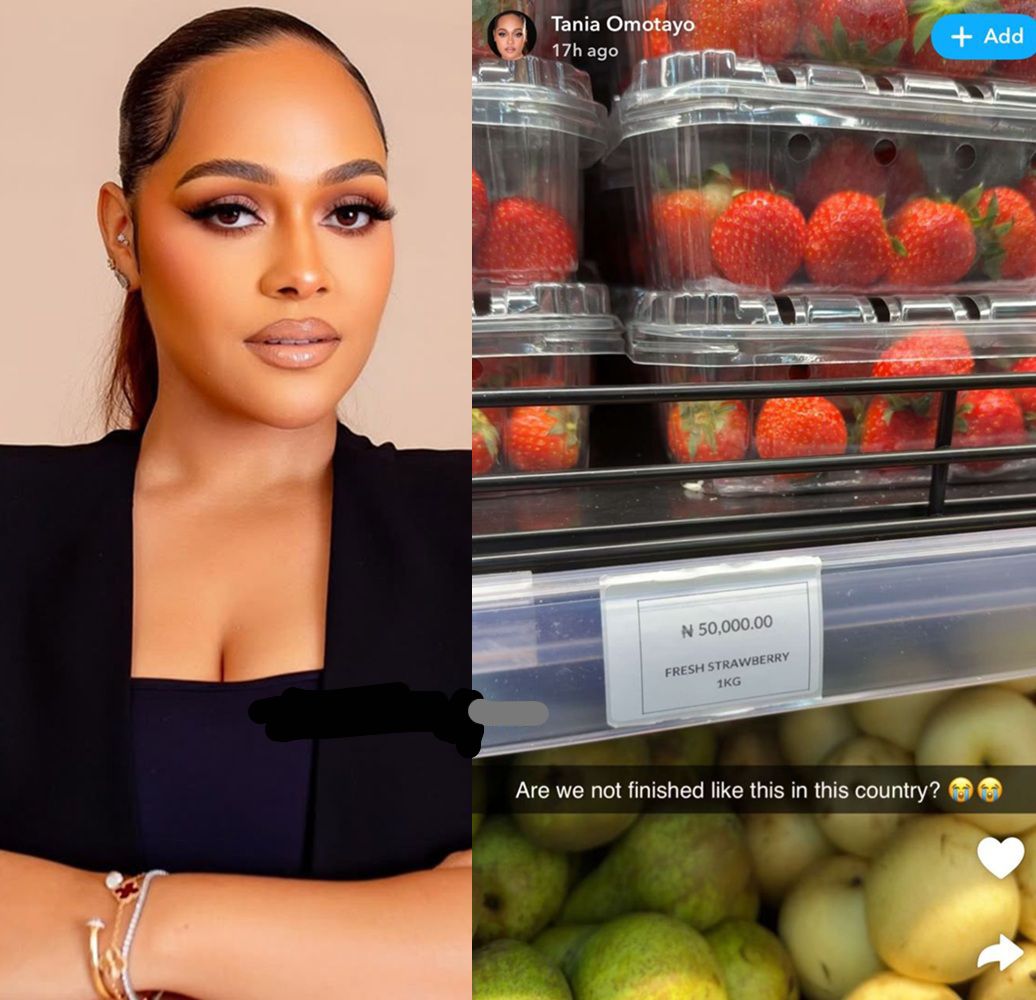
“Are We Not Finished Like This in This Country?” — Tania Omotayo Laments After Spotting ₦50,000 Strawberries at a Supermarket

Nigerian entrepreneur and fashion influencer, Tania Omotayo, has sparked a heated conversation on social media after sharing her shock and frustration upon discovering that a pack of strawberries was being sold for a staggering ₦50,000 at a local supermarket. Her reaction, which many Nigerians quickly resonated with, highlighted the deepening cost-of-living crisis that continues to plague households across the country.
In a post that has since gone viral, the former model and CEO of Ziva Lagos couldn’t hide her disbelief as she questioned how ordinary citizens are expected to survive in a country where even basic groceries have become luxury items. “Are we not finished like this in this country?” she exclaimed, clearly exasperated by what she saw. The statement, though humorous in tone, reflected a collective frustration that many Nigerians share about the current economic reality.
According to Tania, she had walked into a popular upscale supermarket in Lagos to pick up a few items, only to be confronted by the shocking price tag on a small pack of strawberries. The red fruit, often considered a symbol of luxury or special treat, has now become an item that most Nigerians can barely afford. Her post immediately went viral across Instagram and X (formerly Twitter), with many Nigerians flooding her comments to share similar experiences of outrageous price hikes in everyday goods.
“Strawberries ₦50,000? At this point, we might as well start eating grass,” one user commented sarcastically. Another added, “How did we get here? Even fruits are now for the rich.”
The viral post has reignited national discussions about inflation, the plummeting value of the naira, and the unbearable cost of living that has pushed even middle-class families to the brink. Many social media users expressed empathy toward Tania’s frustration, using her experience as a symbol of the broader economic hardship faced by millions of Nigerians daily.
The Nigerian economy has been grappling with persistent inflation, particularly in the food sector. The National Bureau of Statistics (NBS) recently reported that food inflation hit record highs, with prices of fresh produce, imported goods, and even locally grown crops skyrocketing. The removal of fuel subsidies and fluctuating foreign exchange rates have further worsened the situation, causing an unprecedented surge in living costs.
Tania’s emotional outburst, therefore, wasn’t just about strawberries—it was a cry that echoed the pain of an entire nation struggling to survive. For many, ₦50,000 represents more than just the price of a fruit; it’s nearly half a month’s minimum wage. The thought that such a small luxury could cost that much underscores how deeply inflation has eroded the purchasing power of ordinary citizens.
Her viral post has also reignited a wider debate about Nigeria’s heavy dependence on imported goods. Many fruits, including strawberries, are often imported due to limited local production and inadequate agricultural infrastructure. The rising cost of foreign exchange means importers have to spend significantly more to bring in goods, costs that are ultimately passed on to consumers.
“What do you expect when everything is imported?” a commenter on Instagram noted. “Until we start producing these things locally, prices will keep going up. The rich will keep eating strawberries while the rest of us watch them on TV.”
In response to the uproar, some Nigerians have also shared creative and humorous takes on the situation. Memes have flooded social media, showing strawberries being treated like gold or precious stones, while others joked that Nigerians may soon need to apply for loans to buy fruits. The humor, however, barely masks the collective anxiety about where the economy is headed.
For business owners like Tania Omotayo, who operate in Nigeria’s fashion and lifestyle industry, the skyrocketing prices of goods have made it increasingly difficult to maintain stable pricing and business operations. Inflation has not only affected food but also clothing materials, packaging, and logistics. In recent interviews, several entrepreneurs have expressed fears that if the economic trend continues, many small and medium-sized businesses could be forced to shut down.
Tania, who has often been vocal about issues affecting young Nigerians, later clarified that her outrage was not merely about her personal inconvenience but about the unsustainable cost of living in general. “It’s not even about the strawberries,” she reportedly said. “It’s about how everything is just ridiculously expensive now. How are people supposed to live?”
Her comment resonated with many who pointed out that even basic food items like rice, bread, and tomatoes have tripled in price over the past year. A bag of rice now costs over ₦70,000 in some parts of the country, while a single loaf of bread that used to sell for ₦500 is now ₦1,500 or more. Tomatoes, once a staple in every Nigerian kitchen, have become a delicacy due to scarcity and price hikes.
The situation has pushed Nigerians to adopt various coping mechanisms. Many households now opt for smaller meal portions, while others have resorted to skipping meals altogether. Street food vendors have also complained that rising costs are driving away customers, with some forced to close down entirely.
Despite the frustration, Tania’s viral reaction brought some comic relief to an otherwise grim reality. Her exclamation, “Are we not finished like this in this country?” has since become a catchphrase among Nigerians online, used to describe everything from fuel scarcity to the price of electricity units. It captures both the despair and resilience of a people who continue to laugh through hardship.
Social commentators have since weighed in, saying Tania’s post is more than just a moment of shock—it’s a reflection of how economic policies and market failures trickle down to the average consumer. The fact that even affluent Nigerians are publicly lamenting the cost of goods indicates the severity of the situation. “If someone like Tania is complaining about prices, imagine what the average Nigerian is going through,” one journalist wrote.
The ongoing inflation crisis has also raised concerns about health and nutrition. As prices of fruits and vegetables skyrocket, many families are shifting toward cheaper, less nutritious alternatives. Nutritionists have warned that the country may face a rise in diet-related illnesses as healthy foods become unaffordable for most citizens.
By the end of the day, Tania’s rant may have been just another viral social media moment, but it opened a necessary conversation. It showed how something as simple as the price of strawberries could symbolize the broader collapse of affordability in Nigeria. Her words, half-lament and half-warning, captured what millions of Nigerians already feel but may not have the platform to say.
“Are we not finished like this in this country?” she asked. And while many laughed, the uncomfortable truth remains: if the current trend continues unchecked, that question might no longer be rhetorical


